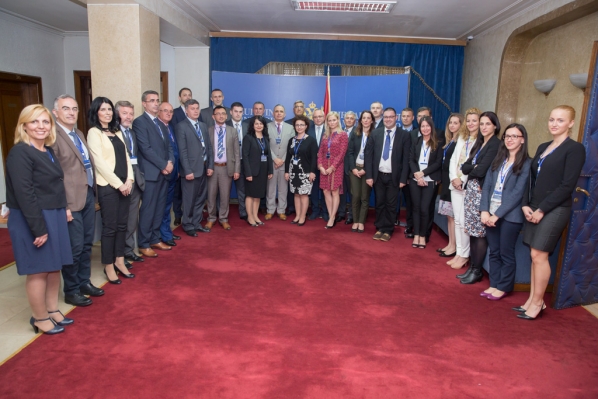Vice President of the Parliament of Montenegro Mr Suljo Mustafić opened the meeting, voicing his pleasure over continuous support by the OSCE Mission to Montenegro. Mr Mustafić says that “the civil society demands increasingly greater effectiveness, accountability, and transparency of the state authorities, which” as he says “imposes the need for constant development of the parliament and adjustment to requirements of the society”. “It is important for the parliament to have a plan of development of the institution, because the convocations change, but the need for strengthening and modernisation of a legislative body is constant”, says Mr Mustafić and concludes that “drafting of planning documents represents a very challenging and complex process for the parliament but its benefits could be manifold”.
The OSCE Deputy Head of Mission to Montenegro Mr Dan Redford extended his gratitude to the Secretary General of the Parliament of Montenegro and his associates for their “dedication and efforts they made to organise this regional event, as well as for continuous contribution to joint activities”. “I believe that as secretaries general of your parliaments you all share this key responsibility to provide unbiased, nonpartisan, and professional expert support to your parliaments, namely your parliamentarians”, said Mr Redford.
Secretary General of the Parliament of Montenegro Mr Siniša Stanković said that “citizens expect a lot from the parliament and demand much more compared to the traditional understanding of the representative democracy”. Mr Stanković added that “the parliamentary democracy is also changing and developing, new mechanisms of interaction and communication and their participation in the legislative process are being introduced, simultaneously with strengthening of accountability of both the parliament and its members”. Mr Stanković pointed out that the Action Plan for Strengthening the Legislative and Oversight Role had proved to be an effective tool for introduction of novelties in the work of the Parliamentary Service, as well as the Parliament as a whole, and that such practice was continued, so the Action Plan was being adopted every year, and published on the website of the Parliament. “Drafting of the Action Plan for a Gender-sensitive Parliament of Montenegro is also ongoing”, said Mr Stanković.
On day one of the meeting, the panel covered topics such as “Challenges and opportunities in parliaments” and “Importance of communication in the strategic approach to parliamentary development”. On day two, the participants exchanged opinions on and experiences in the field of human resources development and ICT planning.
Participants in the meeting “Strategic and annual planning in parliaments - challenges and results” included secretaries general and representatives of parliamentary services of the parliaments of Albania, Bosnia and Herzegovina, Kosovo, Macedonia, Serbia, and Montenegro.
They also adopted conclusions which highlight benefits of strategic approach to development and planning instruments as basis for successful response to the future challenges.









